Impact of Emotional Intelligence of Decision Making
VerifiedAdded on 2023/05/27
|8
|1559
|193
AI Summary
This article discusses the impact of emotional intelligence on decision making. It covers the attributes associated with emotional intelligence, potential biases, and recommendations for overcoming leadership biases.
Contribute Materials
Your contribution can guide someone’s learning journey. Share your
documents today.
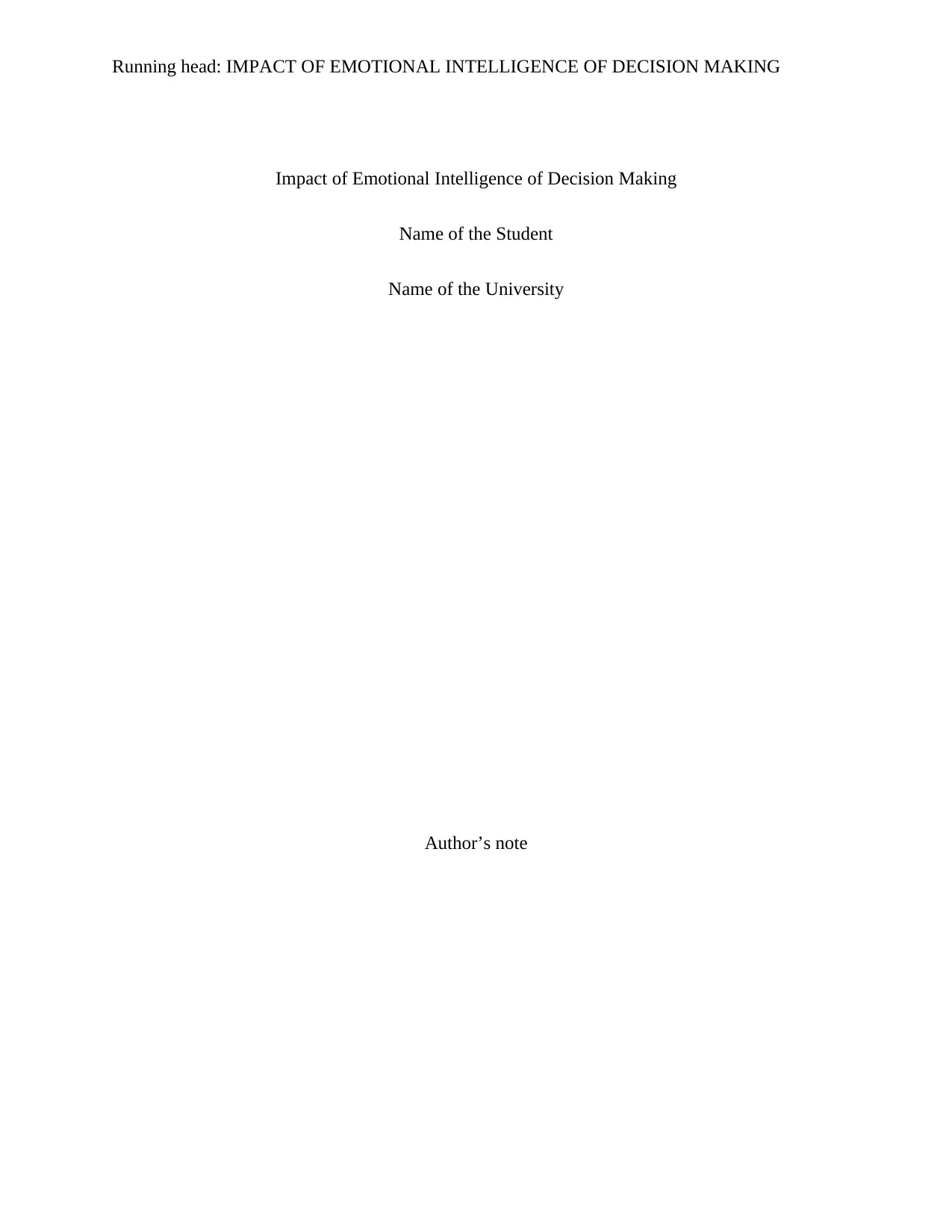
Running head: IMPACT OF EMOTIONAL INTELLIGENCE OF DECISION MAKING
Impact of Emotional Intelligence of Decision Making
Name of the Student
Name of the University
Author’s note
Impact of Emotional Intelligence of Decision Making
Name of the Student
Name of the University
Author’s note
Secure Best Marks with AI Grader
Need help grading? Try our AI Grader for instant feedback on your assignments.
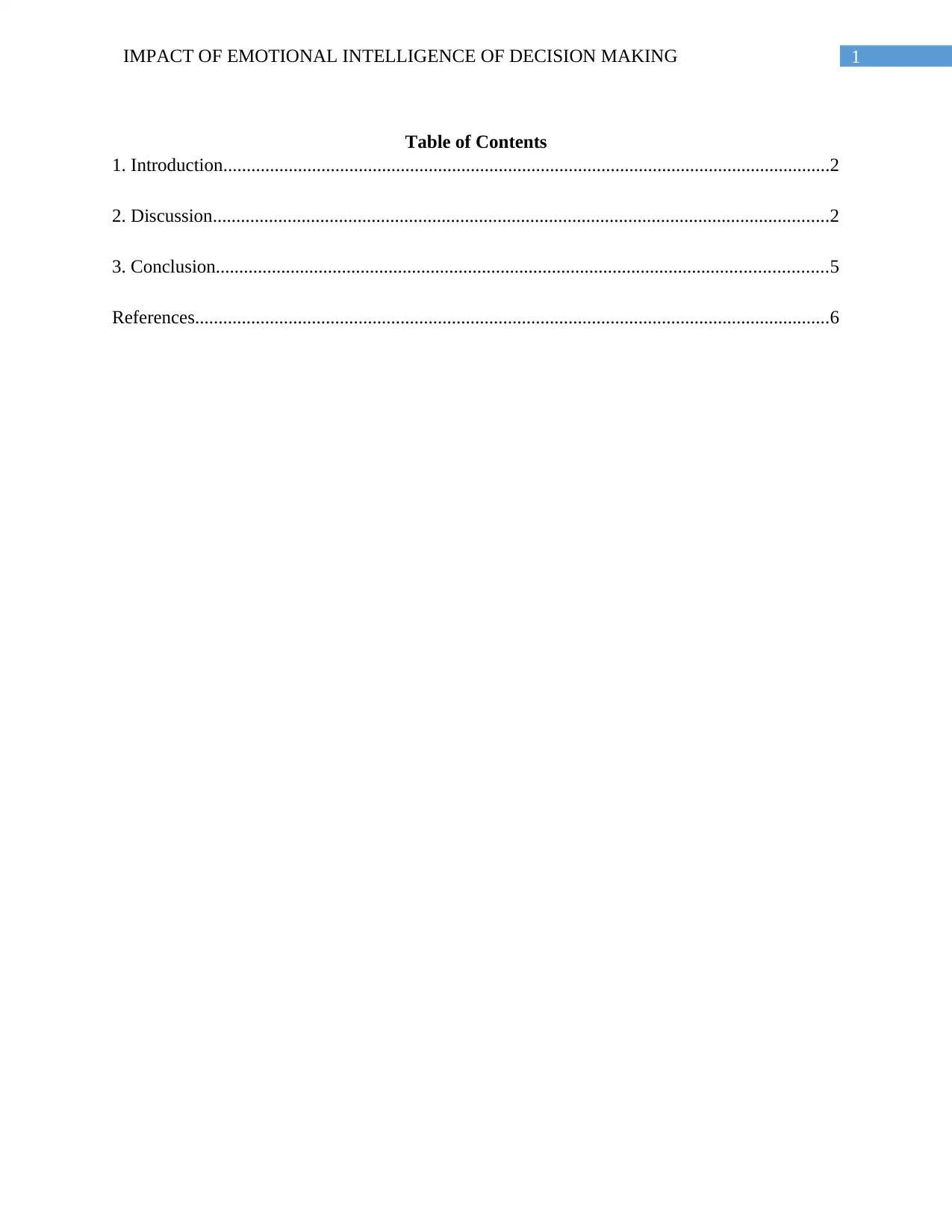
1IMPACT OF EMOTIONAL INTELLIGENCE OF DECISION MAKING
Table of Contents
1. Introduction..................................................................................................................................2
2. Discussion....................................................................................................................................2
3. Conclusion...................................................................................................................................5
References........................................................................................................................................6
Table of Contents
1. Introduction..................................................................................................................................2
2. Discussion....................................................................................................................................2
3. Conclusion...................................................................................................................................5
References........................................................................................................................................6
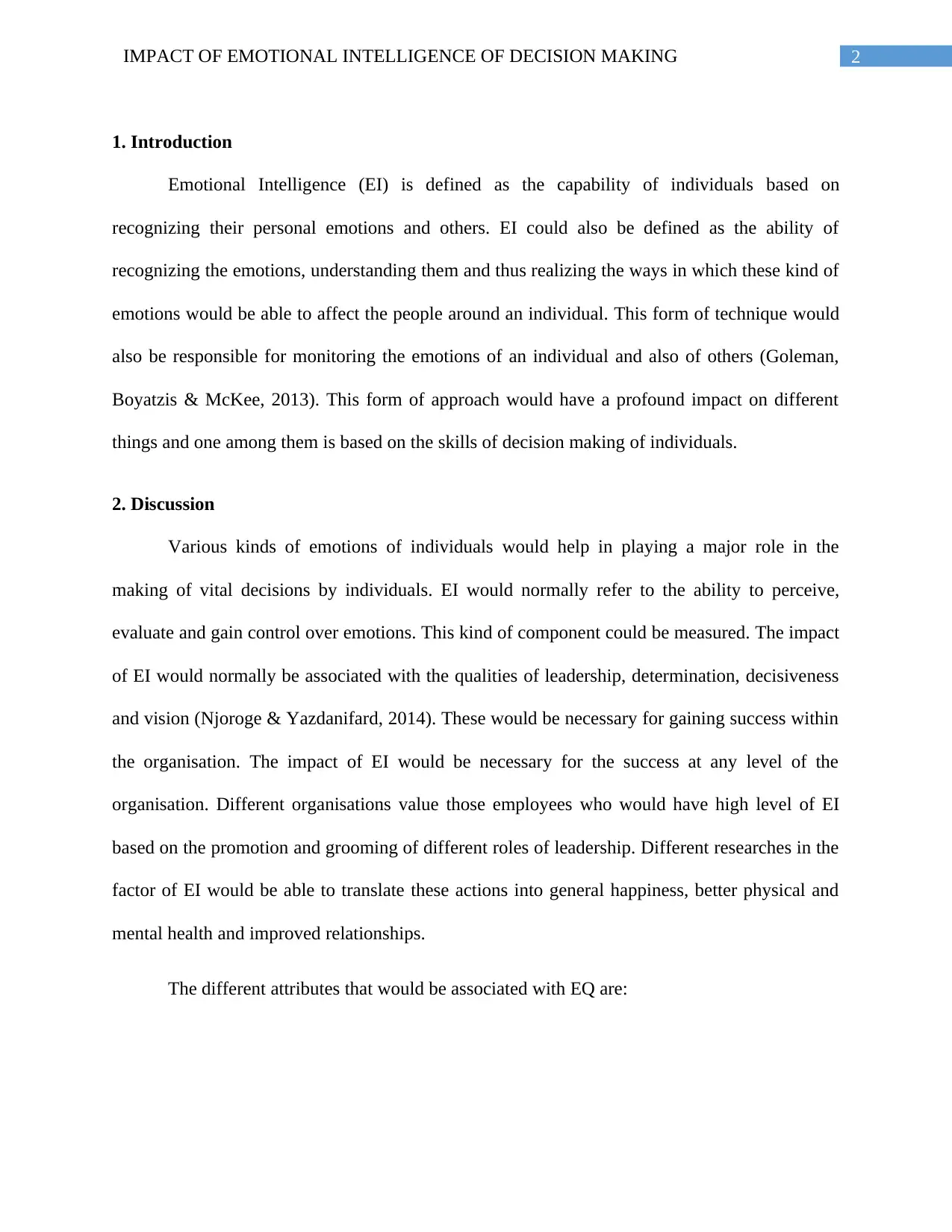
2IMPACT OF EMOTIONAL INTELLIGENCE OF DECISION MAKING
1. Introduction
Emotional Intelligence (EI) is defined as the capability of individuals based on
recognizing their personal emotions and others. EI could also be defined as the ability of
recognizing the emotions, understanding them and thus realizing the ways in which these kind of
emotions would be able to affect the people around an individual. This form of technique would
also be responsible for monitoring the emotions of an individual and also of others (Goleman,
Boyatzis & McKee, 2013). This form of approach would have a profound impact on different
things and one among them is based on the skills of decision making of individuals.
2. Discussion
Various kinds of emotions of individuals would help in playing a major role in the
making of vital decisions by individuals. EI would normally refer to the ability to perceive,
evaluate and gain control over emotions. This kind of component could be measured. The impact
of EI would normally be associated with the qualities of leadership, determination, decisiveness
and vision (Njoroge & Yazdanifard, 2014). These would be necessary for gaining success within
the organisation. The impact of EI would be necessary for the success at any level of the
organisation. Different organisations value those employees who would have high level of EI
based on the promotion and grooming of different roles of leadership. Different researches in the
factor of EI would be able to translate these actions into general happiness, better physical and
mental health and improved relationships.
The different attributes that would be associated with EQ are:
1. Introduction
Emotional Intelligence (EI) is defined as the capability of individuals based on
recognizing their personal emotions and others. EI could also be defined as the ability of
recognizing the emotions, understanding them and thus realizing the ways in which these kind of
emotions would be able to affect the people around an individual. This form of technique would
also be responsible for monitoring the emotions of an individual and also of others (Goleman,
Boyatzis & McKee, 2013). This form of approach would have a profound impact on different
things and one among them is based on the skills of decision making of individuals.
2. Discussion
Various kinds of emotions of individuals would help in playing a major role in the
making of vital decisions by individuals. EI would normally refer to the ability to perceive,
evaluate and gain control over emotions. This kind of component could be measured. The impact
of EI would normally be associated with the qualities of leadership, determination, decisiveness
and vision (Njoroge & Yazdanifard, 2014). These would be necessary for gaining success within
the organisation. The impact of EI would be necessary for the success at any level of the
organisation. Different organisations value those employees who would have high level of EI
based on the promotion and grooming of different roles of leadership. Different researches in the
factor of EI would be able to translate these actions into general happiness, better physical and
mental health and improved relationships.
The different attributes that would be associated with EQ are:
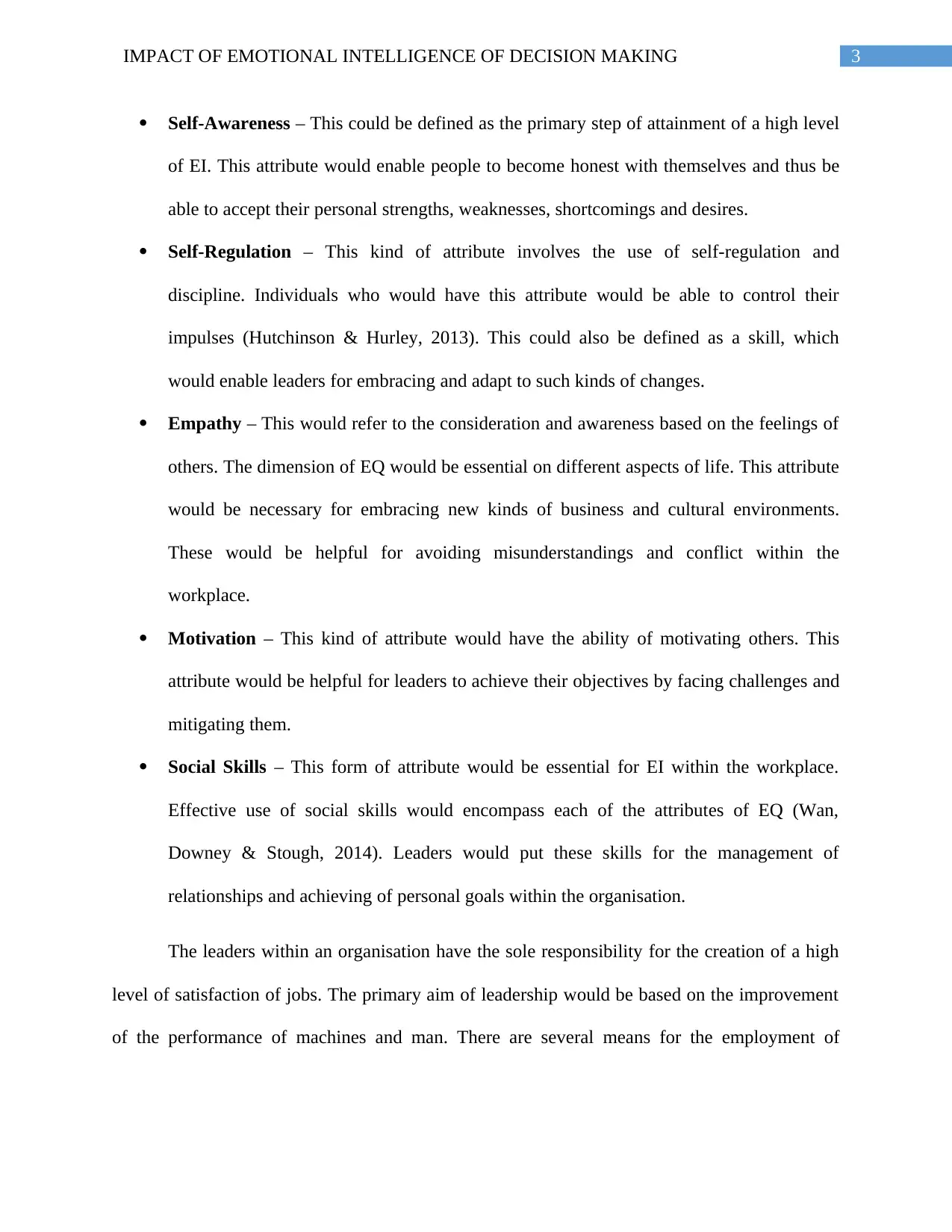
3IMPACT OF EMOTIONAL INTELLIGENCE OF DECISION MAKING
Self-Awareness – This could be defined as the primary step of attainment of a high level
of EI. This attribute would enable people to become honest with themselves and thus be
able to accept their personal strengths, weaknesses, shortcomings and desires.
Self-Regulation – This kind of attribute involves the use of self-regulation and
discipline. Individuals who would have this attribute would be able to control their
impulses (Hutchinson & Hurley, 2013). This could also be defined as a skill, which
would enable leaders for embracing and adapt to such kinds of changes.
Empathy – This would refer to the consideration and awareness based on the feelings of
others. The dimension of EQ would be essential on different aspects of life. This attribute
would be necessary for embracing new kinds of business and cultural environments.
These would be helpful for avoiding misunderstandings and conflict within the
workplace.
Motivation – This kind of attribute would have the ability of motivating others. This
attribute would be helpful for leaders to achieve their objectives by facing challenges and
mitigating them.
Social Skills – This form of attribute would be essential for EI within the workplace.
Effective use of social skills would encompass each of the attributes of EQ (Wan,
Downey & Stough, 2014). Leaders would put these skills for the management of
relationships and achieving of personal goals within the organisation.
The leaders within an organisation have the sole responsibility for the creation of a high
level of satisfaction of jobs. The primary aim of leadership would be based on the improvement
of the performance of machines and man. There are several means for the employment of
Self-Awareness – This could be defined as the primary step of attainment of a high level
of EI. This attribute would enable people to become honest with themselves and thus be
able to accept their personal strengths, weaknesses, shortcomings and desires.
Self-Regulation – This kind of attribute involves the use of self-regulation and
discipline. Individuals who would have this attribute would be able to control their
impulses (Hutchinson & Hurley, 2013). This could also be defined as a skill, which
would enable leaders for embracing and adapt to such kinds of changes.
Empathy – This would refer to the consideration and awareness based on the feelings of
others. The dimension of EQ would be essential on different aspects of life. This attribute
would be necessary for embracing new kinds of business and cultural environments.
These would be helpful for avoiding misunderstandings and conflict within the
workplace.
Motivation – This kind of attribute would have the ability of motivating others. This
attribute would be helpful for leaders to achieve their objectives by facing challenges and
mitigating them.
Social Skills – This form of attribute would be essential for EI within the workplace.
Effective use of social skills would encompass each of the attributes of EQ (Wan,
Downey & Stough, 2014). Leaders would put these skills for the management of
relationships and achieving of personal goals within the organisation.
The leaders within an organisation have the sole responsibility for the creation of a high
level of satisfaction of jobs. The primary aim of leadership would be based on the improvement
of the performance of machines and man. There are several means for the employment of
Secure Best Marks with AI Grader
Need help grading? Try our AI Grader for instant feedback on your assignments.
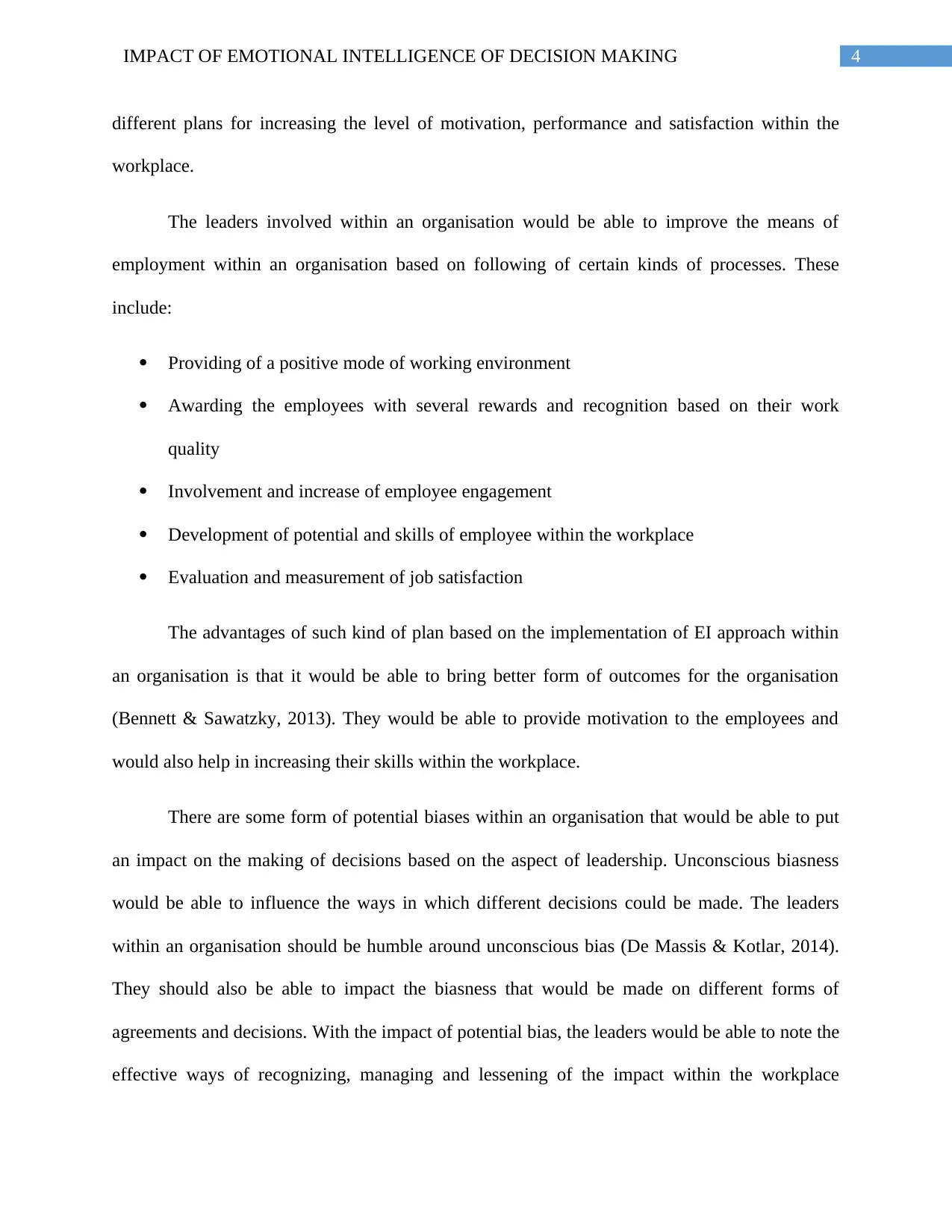
4IMPACT OF EMOTIONAL INTELLIGENCE OF DECISION MAKING
different plans for increasing the level of motivation, performance and satisfaction within the
workplace.
The leaders involved within an organisation would be able to improve the means of
employment within an organisation based on following of certain kinds of processes. These
include:
Providing of a positive mode of working environment
Awarding the employees with several rewards and recognition based on their work
quality
Involvement and increase of employee engagement
Development of potential and skills of employee within the workplace
Evaluation and measurement of job satisfaction
The advantages of such kind of plan based on the implementation of EI approach within
an organisation is that it would be able to bring better form of outcomes for the organisation
(Bennett & Sawatzky, 2013). They would be able to provide motivation to the employees and
would also help in increasing their skills within the workplace.
There are some form of potential biases within an organisation that would be able to put
an impact on the making of decisions based on the aspect of leadership. Unconscious biasness
would be able to influence the ways in which different decisions could be made. The leaders
within an organisation should be humble around unconscious bias (De Massis & Kotlar, 2014).
They should also be able to impact the biasness that would be made on different forms of
agreements and decisions. With the impact of potential bias, the leaders would be able to note the
effective ways of recognizing, managing and lessening of the impact within the workplace
different plans for increasing the level of motivation, performance and satisfaction within the
workplace.
The leaders involved within an organisation would be able to improve the means of
employment within an organisation based on following of certain kinds of processes. These
include:
Providing of a positive mode of working environment
Awarding the employees with several rewards and recognition based on their work
quality
Involvement and increase of employee engagement
Development of potential and skills of employee within the workplace
Evaluation and measurement of job satisfaction
The advantages of such kind of plan based on the implementation of EI approach within
an organisation is that it would be able to bring better form of outcomes for the organisation
(Bennett & Sawatzky, 2013). They would be able to provide motivation to the employees and
would also help in increasing their skills within the workplace.
There are some form of potential biases within an organisation that would be able to put
an impact on the making of decisions based on the aspect of leadership. Unconscious biasness
would be able to influence the ways in which different decisions could be made. The leaders
within an organisation should be humble around unconscious bias (De Massis & Kotlar, 2014).
They should also be able to impact the biasness that would be made on different forms of
agreements and decisions. With the impact of potential bias, the leaders would be able to note the
effective ways of recognizing, managing and lessening of the impact within the workplace
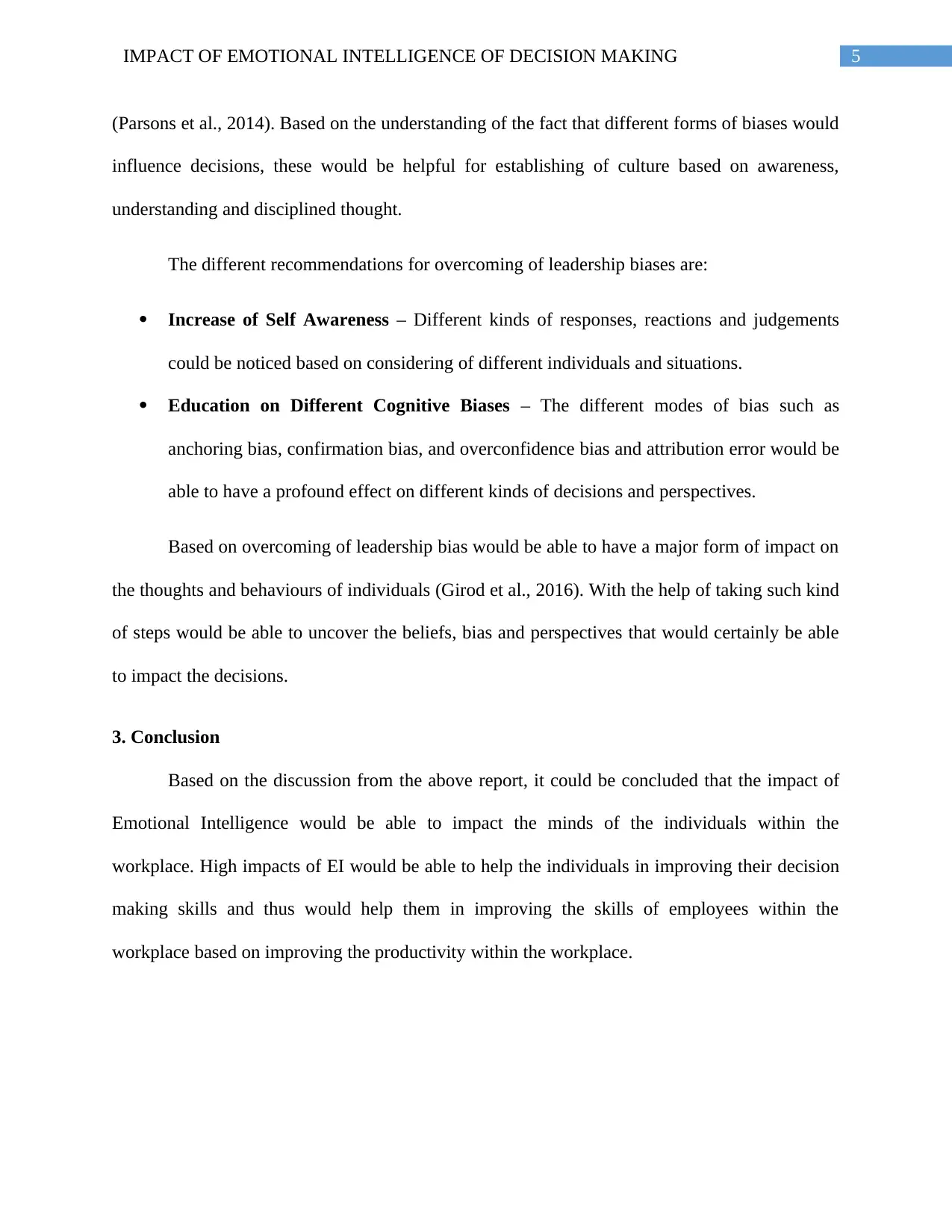
5IMPACT OF EMOTIONAL INTELLIGENCE OF DECISION MAKING
(Parsons et al., 2014). Based on the understanding of the fact that different forms of biases would
influence decisions, these would be helpful for establishing of culture based on awareness,
understanding and disciplined thought.
The different recommendations for overcoming of leadership biases are:
Increase of Self Awareness – Different kinds of responses, reactions and judgements
could be noticed based on considering of different individuals and situations.
Education on Different Cognitive Biases – The different modes of bias such as
anchoring bias, confirmation bias, and overconfidence bias and attribution error would be
able to have a profound effect on different kinds of decisions and perspectives.
Based on overcoming of leadership bias would be able to have a major form of impact on
the thoughts and behaviours of individuals (Girod et al., 2016). With the help of taking such kind
of steps would be able to uncover the beliefs, bias and perspectives that would certainly be able
to impact the decisions.
3. Conclusion
Based on the discussion from the above report, it could be concluded that the impact of
Emotional Intelligence would be able to impact the minds of the individuals within the
workplace. High impacts of EI would be able to help the individuals in improving their decision
making skills and thus would help them in improving the skills of employees within the
workplace based on improving the productivity within the workplace.
(Parsons et al., 2014). Based on the understanding of the fact that different forms of biases would
influence decisions, these would be helpful for establishing of culture based on awareness,
understanding and disciplined thought.
The different recommendations for overcoming of leadership biases are:
Increase of Self Awareness – Different kinds of responses, reactions and judgements
could be noticed based on considering of different individuals and situations.
Education on Different Cognitive Biases – The different modes of bias such as
anchoring bias, confirmation bias, and overconfidence bias and attribution error would be
able to have a profound effect on different kinds of decisions and perspectives.
Based on overcoming of leadership bias would be able to have a major form of impact on
the thoughts and behaviours of individuals (Girod et al., 2016). With the help of taking such kind
of steps would be able to uncover the beliefs, bias and perspectives that would certainly be able
to impact the decisions.
3. Conclusion
Based on the discussion from the above report, it could be concluded that the impact of
Emotional Intelligence would be able to impact the minds of the individuals within the
workplace. High impacts of EI would be able to help the individuals in improving their decision
making skills and thus would help them in improving the skills of employees within the
workplace based on improving the productivity within the workplace.
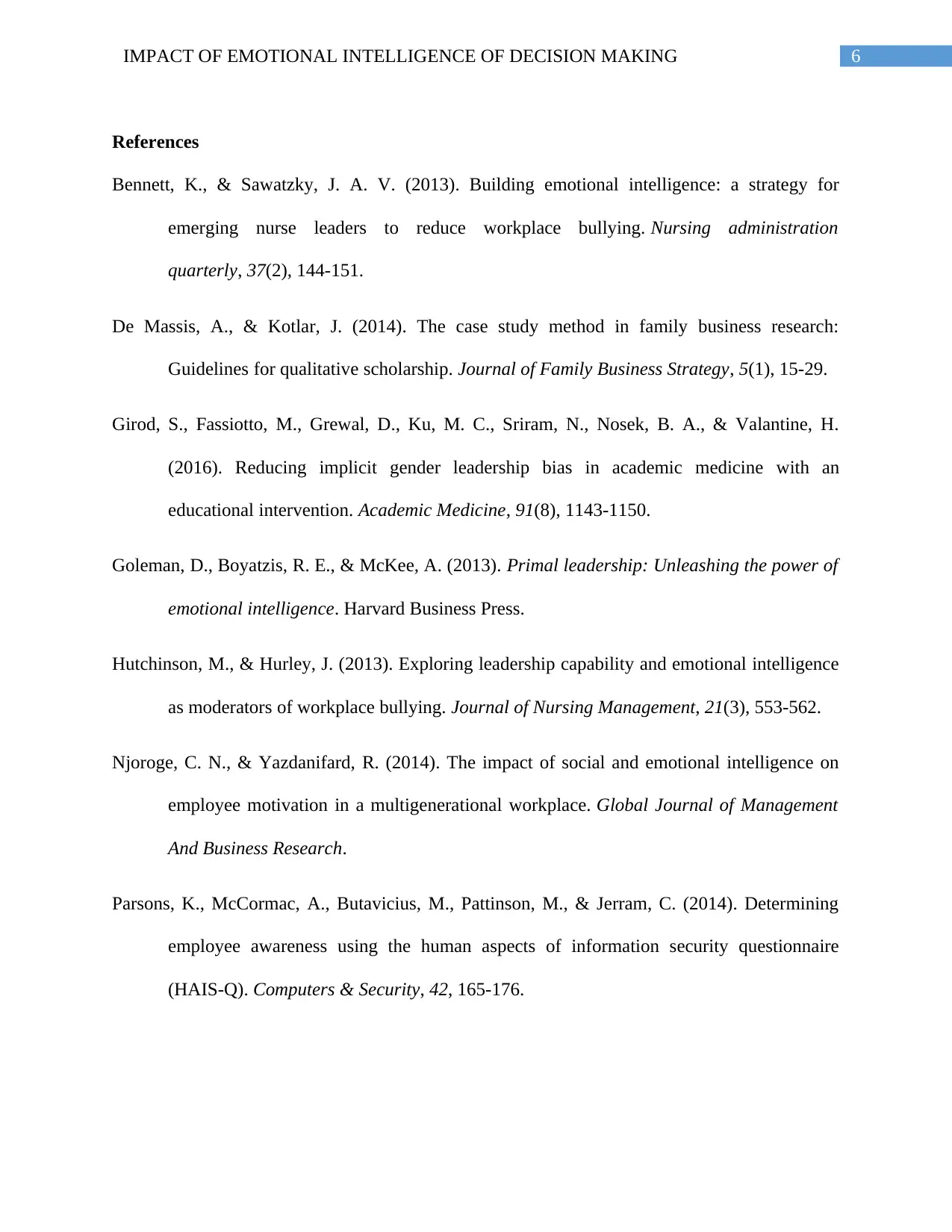
6IMPACT OF EMOTIONAL INTELLIGENCE OF DECISION MAKING
References
Bennett, K., & Sawatzky, J. A. V. (2013). Building emotional intelligence: a strategy for
emerging nurse leaders to reduce workplace bullying. Nursing administration
quarterly, 37(2), 144-151.
De Massis, A., & Kotlar, J. (2014). The case study method in family business research:
Guidelines for qualitative scholarship. Journal of Family Business Strategy, 5(1), 15-29.
Girod, S., Fassiotto, M., Grewal, D., Ku, M. C., Sriram, N., Nosek, B. A., & Valantine, H.
(2016). Reducing implicit gender leadership bias in academic medicine with an
educational intervention. Academic Medicine, 91(8), 1143-1150.
Goleman, D., Boyatzis, R. E., & McKee, A. (2013). Primal leadership: Unleashing the power of
emotional intelligence. Harvard Business Press.
Hutchinson, M., & Hurley, J. (2013). Exploring leadership capability and emotional intelligence
as moderators of workplace bullying. Journal of Nursing Management, 21(3), 553-562.
Njoroge, C. N., & Yazdanifard, R. (2014). The impact of social and emotional intelligence on
employee motivation in a multigenerational workplace. Global Journal of Management
And Business Research.
Parsons, K., McCormac, A., Butavicius, M., Pattinson, M., & Jerram, C. (2014). Determining
employee awareness using the human aspects of information security questionnaire
(HAIS-Q). Computers & Security, 42, 165-176.
References
Bennett, K., & Sawatzky, J. A. V. (2013). Building emotional intelligence: a strategy for
emerging nurse leaders to reduce workplace bullying. Nursing administration
quarterly, 37(2), 144-151.
De Massis, A., & Kotlar, J. (2014). The case study method in family business research:
Guidelines for qualitative scholarship. Journal of Family Business Strategy, 5(1), 15-29.
Girod, S., Fassiotto, M., Grewal, D., Ku, M. C., Sriram, N., Nosek, B. A., & Valantine, H.
(2016). Reducing implicit gender leadership bias in academic medicine with an
educational intervention. Academic Medicine, 91(8), 1143-1150.
Goleman, D., Boyatzis, R. E., & McKee, A. (2013). Primal leadership: Unleashing the power of
emotional intelligence. Harvard Business Press.
Hutchinson, M., & Hurley, J. (2013). Exploring leadership capability and emotional intelligence
as moderators of workplace bullying. Journal of Nursing Management, 21(3), 553-562.
Njoroge, C. N., & Yazdanifard, R. (2014). The impact of social and emotional intelligence on
employee motivation in a multigenerational workplace. Global Journal of Management
And Business Research.
Parsons, K., McCormac, A., Butavicius, M., Pattinson, M., & Jerram, C. (2014). Determining
employee awareness using the human aspects of information security questionnaire
(HAIS-Q). Computers & Security, 42, 165-176.
Paraphrase This Document
Need a fresh take? Get an instant paraphrase of this document with our AI Paraphraser

7IMPACT OF EMOTIONAL INTELLIGENCE OF DECISION MAKING
Wan, H. C., Downey, L. A., & Stough, C. (2014). Understanding non-work presenteeism:
Relationships between emotional intelligence, boredom, procrastination and job
stress. Personality and Individual Differences, 65, 86-90.
Wan, H. C., Downey, L. A., & Stough, C. (2014). Understanding non-work presenteeism:
Relationships between emotional intelligence, boredom, procrastination and job
stress. Personality and Individual Differences, 65, 86-90.
1 out of 8
Related Documents
Your All-in-One AI-Powered Toolkit for Academic Success.
+13062052269
info@desklib.com
Available 24*7 on WhatsApp / Email
![[object Object]](/_next/static/media/star-bottom.7253800d.svg)
Unlock your academic potential
© 2024 | Zucol Services PVT LTD | All rights reserved.





